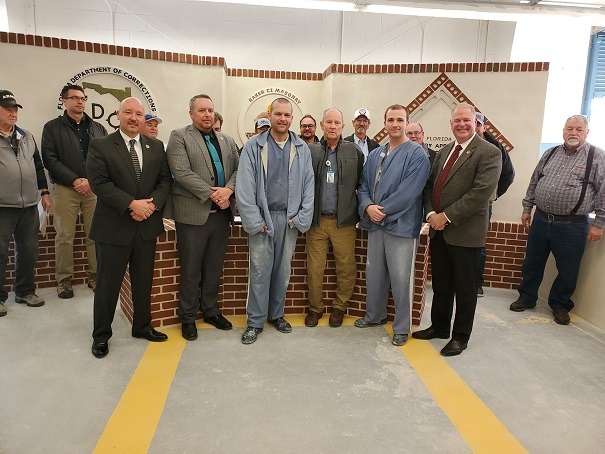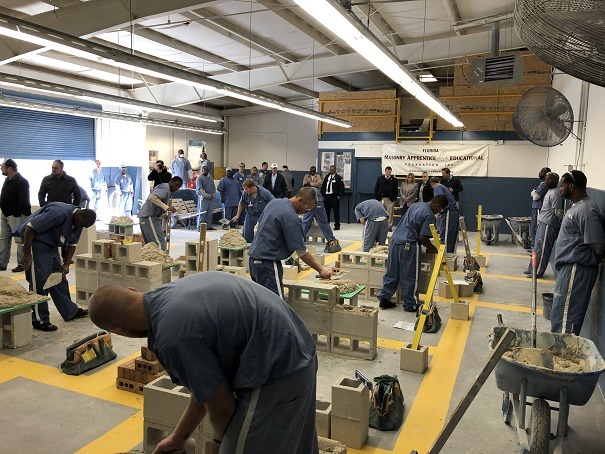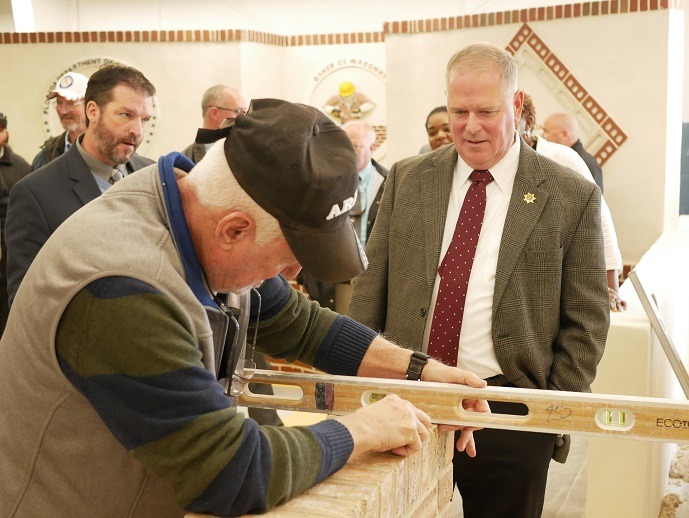Building Walls Behind Bars: A Closer Look at the FDOC CTE Masonry Program
Words: Cass Stern
Words: Cassandra Stern
Photos: Swede Melgaard
In June 2019, the Florida Department of Corrections (FDOC) released the most recent Florida Prison Recidivism Report. Every year, the Bureau of Research and Data Analysis within the Florida Department of Corrections takes a hard look at the rate of recidivism in their institutions- or the percentage of previously incarcerated inmates who re-offend within three years after release and return to the prison system. At the time of our last article in the December 2017 issue, the Florida prison system housed approximately 95,000 inmates, and at the time of this writing, there are approximately 94,000.
In the state of Florida, 86% of prisoners currently incarcerated will, at some point, be released and return to their communities, and of those, 24.7% of inmates released in 2015 have returned to the FDOC three years later. Repeat offenders pose a unique challenge to the state and federal penal system, as well as a significantly higher burden on the state’s financial resources. However, there is one factor, in particular, that seems to make a marked difference in recidivism rates, as noted in the same report.
Of the inmates released in 2015, those who were employed at release saw a recidivism rate of 17%, a full 8% lower than the overall average. Many of those employed at release were able to obtain that employment by completing one of the many Career & Technical Education programs offered by the FDOC, including ones in masonry and other construction careers.
Enter Robert “Swede” Melgaard. A fourth-generation mason, former masonry instructor, and a rising star in the FDOC, Swede, as he prefers to be called, cuts an impressive figure around the prison yard. Raised in a masonry family, he worked for his father and uncle’s masonry company straight out of high school, got an opportunity to become a masonry instructor, and never looked back.

Swede spent 12 years as a masonry instructor at Baker Correctional Institution before being promoted to Career & Technical Education Programs Regional Coordinator in 2017, a promotion which was swiftly followed six months later by another to Career & Technical Education Programs Administrator of the Office of Programs and Re-Entry for Florida Department of Corrections.
As the Career & Technical Education Programs Administrator for the entire prison system in the State of Florida, Swede is responsible for overseeing 94 programs in 42 different trade areas. But as a former masonry instructor, it’s clear that the masonry program is especially close to his heart. “My daughter is even named Macyn,” he shared proudly, which just further demonstrates the love he has for the industry and for his career.
We spoke with Swede back in 2017 around the time of these promotions, which was also an exciting time for the FDOC Masonry CTE Program thanks to its newly forged partnership with the Florida Masonry Apprentice and Educational Foundation (FMAEF) and the Masonry Association of Florida. Since that time, their role with the FDOC’s Masonry CTE program has continued to grow and expand, and it is this relationship that Swede is particularly grateful for when it comes to crediting the program’s success.
“The success is the relationship that we’ve built with the industry, the Masonry Association of Florida, the Foundation, their willingness to support the program with guest speakers...without them. It would be very challenging to have the success that we see now. It’s been phenomenal.” — Swede Melgaard
In addition to helping program participants with pre-release job interviews, the FMAEF provides guest speakers, and provides many other much-needed services and supports for the FDOC Masonry CTE Program. In exchange, the FDOC has had their masonry instructors certified as judges for a variety of masonry competitions, including the Bricklayer 500, Fastest Trowel, and Masonry Skills Competitions. This is a great opportunity for the industry to benefit in multiple ways from their efforts and encourages workforce development on multiple levels, which is important for the industry now more than ever.
To Swede, however, the value of the program is closer to two-fold. “It’s a second chance for a student to learn a skill, to be successful in life, and to take care of themselves and their families,” he says, but “it’s also great for the industry because there’s a shortage of skilled workers out there and we can provide that.”

There are Masonry CTE programs available to both men and women, and they are open to anyone who qualifies based on a ranking system that weights release date, Test of Basic Adult Education (TABE) scores, and a few other factors. For the FDOC Masonry CTE program, participants must score 9.0 or better in English and Math to qualify for the program. However, if they fail to achieve qualifying marks, there are other education programs that can help applicants raise their scores to a satisfactory level.
Applicants are placed on a waiting list as there are a select number of available spots in the program, and once enrolled, the students learn a full NCCER curriculum, which is a total of approximately 1,650 hours of training and education. Students are provided with all of the tools, supplies, and instruction they need to become successfully employed career masons upon their release.

One exciting opportunity afforded through the program is the chance to participate in the Open House events, which take place a few times every year. During these events, Swede explains, “we invite in industry folks, the Masonry Association of Florida, the Florida Masonry Apprentice and Education Foundation, the Florida Concrete Masonry Education Council, as well as contractors, employers, and just industry suppliers. They come into our institutions, they visit our programs, do some guest speaking, also some pre-release interviews for our students.”
Through these Open House events, program participants have the chance to meet with mason contractors, sometimes several times, which helps to build up a rapport, as well as show contractors the quality of work the student is capable of producing. In turn, these meetings help to ease the stress of leaving prison and reintegrating into society by ensuring the student has guaranteed gainful employment immediately upon release. For some students, these mock interviews and meetings with contractors are the first they have ever done in their lives. It is also incredibly inspiring to everyone involved in the program to see the masonry community rally around the students to provide the support they need to succeed.
In addition to Open House events, 2020 saw another exciting event at the FDOC: the first intra-institutional masonry competition! Described as being similar to the SkillsUSA competitions, each institution’s masonry CTE program brought two students to one location. The students were challenged to construct a project that was then judged by mason contractors who determined which program was the best.

Out of the 16 participants, it was Baker Correctional Institution that reigned supreme with the highest combined score of the day. The winning institution was awarded the Golden Trowel trophy, which will be engraved with the winner’s name and housed at Baker Correctional until next year’s fight to keep their title.
The trophy “was a huge motivational factor, and the pride was evident,” said Swede. “Some of the guys teared up. We did announce individual winners as well, the top five, and the instructors were super happy.” Additionally, “the institution and the administration were there, and they were excited and cheering on their guys! It was a great event just from start to finish.”
In order to prepare for the competition, students were provided with the project specifications ahead of time to be able to practice. Each program held a contest within their respective institution to determine the two best masonry students to represent them to qualify for the competition.
Once selected, those students constructed the same projects again for the judges. Both the project and judges were provided by the Masonry Foundation, as well as a donation of brand new materials for the contest. Overall, the event was deemed successful by all who participated and attended and is well on track to being repeated again next year.
The FDOC program, Swede admits, has been in the spotlight a lot more recently, which is due in no small part to efforts like the recent competition. The Masonry CTE programs have been so successful that other states are now looking to see how they can replicate the FDOC’s model at home. Nowadays, Swede days, “they do a lot of tours there at Baker. The Nevada Department of Corrections came in and toured, and they want to do something similar, Texas is coming next week, other states call all the time and inquire about what we’re doing and how they can replicate that as well.”

Considering this program and others like it are so successful, it’s a wonder that they aren’t already in every prison across the country. Funding is certainly an issue, but for the masonry CTE programs specifically, there’s another more pressing issue holding Swede and others in his position back from expanding their programs more fully: qualified instructors. “Ideally, we would like to have one in every prison,” says Swede, “but you’d have to staff and fund the program, and it’s not really too expensive to start a masonry program.” However, it’s the industry support that is crucial to getting a program off the ground, and without that, it’s an uphill battle.
For anyone who questions the impact a program like the FDOC’s Masonry CTE program can have on someone’s life, I’ll leave you with a short story Swede shared with me near the end of our interview. “Al Herndon, FMAEF, actually recently bumped into a former student of mine who was asking about me,” he said, “he was still working in the masonry industry. He had been out [of prison] for about two or three years, and most importantly, he was doing great.”